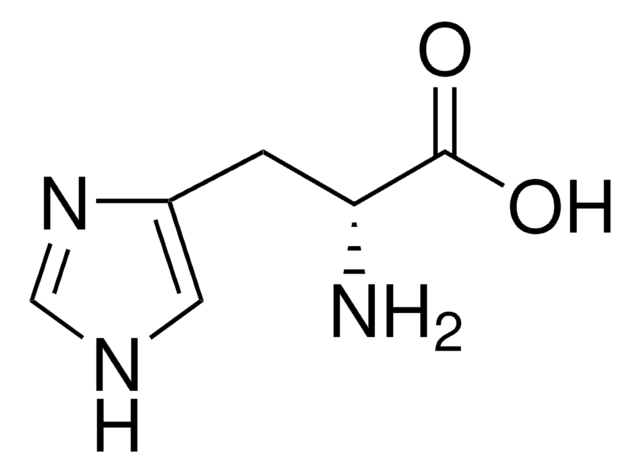H3911
L-Histidine
Pharma Manufacturing
Synonym(s):
(S)-2-Amino-3-(4-imidazolyl)propionic acid, NSC 137773
About This Item
Recommended Products
biological source
non-animal source
Quality Level
Assay
≥98.5%
form
crystalline powder
technique(s)
cell culture | mammalian: suitable
impurities
endotoxin, heavy metals, trace metals, residual solvents, tested
mp
282 °C (dec.) (lit.)
solubility
H2O: 50 mg/mL
suitability
suitable for manufacturing use
application(s)
pharmaceutical (small molecule)
foreign activity
cytotoxicity, tested
SMILES string
N[C@@H](Cc1c[nH]cn1)C(O)=O
InChI
1S/C6H9N3O2/c7-5(6(10)11)1-4-2-8-3-9-4/h2-3,5H,1,7H2,(H,8,9)(H,10,11)/t5-/m0/s1
InChI key
HNDVDQJCIGZPNO-YFKPBYRVSA-N
Looking for similar products? Visit Product Comparison Guide
General description
M-Clarity Program
Our comprehensive portfolio of upstream process chemicals not only provides biopharmaceutical manufacturers with high-quality raw materials for production of classical and novel therapies, but also helps them get to market faster and simplify regulatory challenges. Trust us to deliver supply chain transparency and reliable sourcing around the globe, streamlining your product qualification with best-in-class regulatory support and service.
Application
Biochem/physiol Actions
Legal Information
Storage Class Code
11 - Combustible Solids
WGK
WGK 1
Flash Point(F)
Not applicable
Flash Point(C)
Not applicable
Personal Protective Equipment
Certificates of Analysis (COA)
Search for Certificates of Analysis (COA) by entering the products Lot/Batch Number. Lot and Batch Numbers can be found on a product’s label following the words ‘Lot’ or ‘Batch’.
Already Own This Product?
Find documentation for the products that you have recently purchased in the Document Library.
Customers Also Viewed
Chromatograms
application for HPLCOur team of scientists has experience in all areas of research including Life Science, Material Science, Chemical Synthesis, Chromatography, Analytical and many others.
Contact Technical Service





